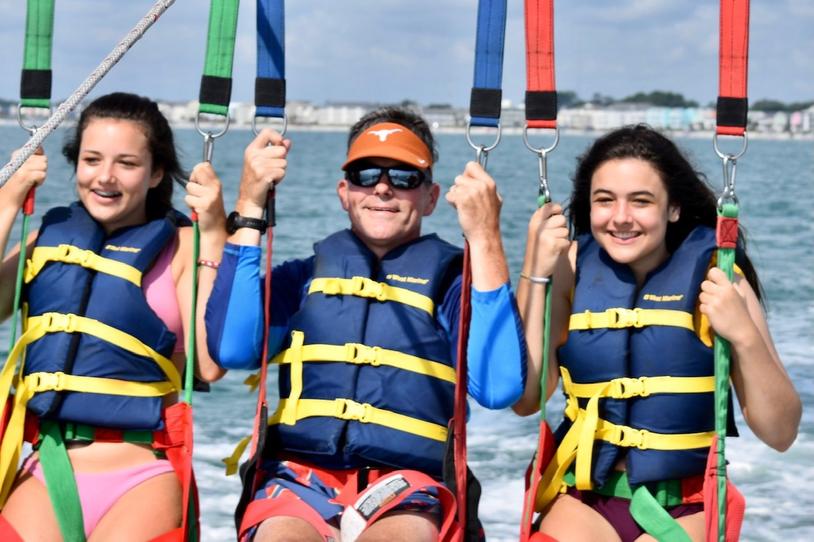
MJFF community member and deputy to the president for societal challenges and opportunities at The University of Texas at Austin Allan Cole with his daughters.
I received a diagnosis of young-onset Parkinson’s disease five years ago, at the age of 48, and I immediately became preoccupied with becoming disabled. Among my greatest concerns was that I would quickly lose the ability to do things I enjoyed, such as swimming and biking with my kids, working out at the gym, traveling with my family, and teaching at my university. Anxious that I would have to stop doing any of these things, or other things that bring me joy and meaning, I remember asking my doctor to assure me that I would dance at my daughters’ weddings (they were aged 10 and 8 at the time), to which she responded, “I am confident you will.”
I now realize that this expectation was naïve on more than one front. My daughters might not want to get married or have a wedding. Nevertheless, as often happens with a Parkinson’s diagnosis, anxiety took over my worldview and had its say for nearly a year; but at the end of that long year, I’m glad to tell you my stress started to wane for three reasons.
First, I got to know numerous people living with Parkinson’s who remained active and doing what they loved for many years — even decades — after their diagnosis. Second, I shifted my focus away from an unknown future and toward celebrating the gift of today, and I started to consider what I have more than what I might someday lose. Third, I began to learn from those who live with disabilities, who may face obstacles to doing certain things but who also learn to mitigate those challenges and, often, discover new talents and opportunities. I started seeing disability through a lens of strengths, not merely of deficits.
What I was naïve about is just how much ability those who have disabilities possess. Those living with disabilities offer distinct insights and perspectives; they exhibit resilience-born wisdom, as well as discipline and a strong work ethic. Because persons with disabilities must constantly adapt to their surroundings, they also bring creativity, agility, persistence, openness, forethought, and capacity for solving problems.[1] These strengths are admirable, attractive, and they serve anyone and any community well.
Similar to my naivety regarding my daughters getting married, I was naïve about those who live with disabilities, or who, like me, might become disabled someday. I now recognize that we are strong, unique, and we enhance the common good. We may have disabilities but these need not define us, nor do they limit our potential in every way. Remembering our strengths and opportunities helps me feel less anxious about the future and more empowered for living with Parkinson's today.
[1] https://www.accenture.com/t20181108T081959Z__w__/us-en/_acnmedia/PDF-89/Accenture-Disability-Inclusion-Research-Report.pdf#zoom=50
Allan Cole is Deputy to the President for Societal Challenges and Opportunities at The University of Texas at Austin, where he also serves as a professor in The Steve Hicks School of Social Work, and, by courtesy, as a professor of psychiatry and behavioral sciences at the Dell Medical School. Diagnosed with Parkinson’s in 2016, at the age of 48, he is the author or editor of many books on a range of topics related to bereavement, anxiety, and spirituality. His latest book is Counseling Persons with Parkinson’s Disease (Oxford University Press, 2021). His next book, Discerning the Way: Lessons from Parkinson’s Disease (Cascade), will be published later this year. His first book of poetry, In the Care of Plenty: Poems (Resource Publications), will be published in 2022. Follow him on Twitter @PDWise, and his blog PDWise.com.